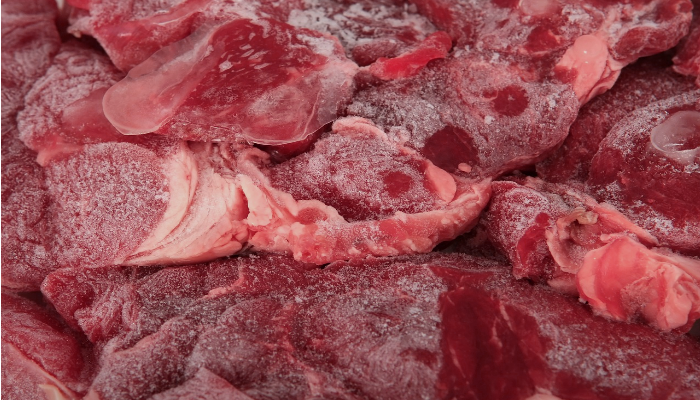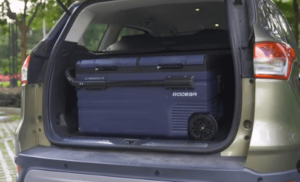I get it. You want to save money and don’t have time to cook all the meat you buy from Costco before it spoils. That’s why I am here! This blog post will answer your question of does frozen meat affects quality. We’ll discuss what happens when we freeze our food and how this affects our frozen meats’ taste, texture, and nutrients.
Freezing food does not affect its nutritional content, but it does change the taste and texture of meat. To maintain a good quality tasting meal, you need to thaw your frozen meat before cooking. You can do this in the refrigerator or microwave oven if need be!
Does Freezing Meat Affect Quality: The Effects on Taste & Texture
When we freeze our foods, they are subjected to large amounts of air which causes them to lose their flavor and elasticity. We also may experience freezer burn when there is too much contact with dry ice making some parts soggy or, worse yet, completely dried out by the cold temperatures. These changes create an unpleasant eating experience that disappoints us every time we cut into our juicy steak.
Does Freezing Meat Affect Quality: The Effects on Nutritional Content
Freezing does not affect the nutritional content of meat, but it does change how it tastes and may make some nutrients more challenging to absorb. We all know that eating healthy is vital for our health, so this can be a significant downfall when achieving your goals. However, we can work around this issue by choosing leaner cuts of meat that are less likely to dry out in the freezer.
Despite these disadvantages, freezing still has many benefits! It helps maintain an even temperature inside the fridge or during transportation and storage and slow spoilage rates because bacteria cannot grow at such low temperatures (around -20 degrees Fahrenheit). Freezing also ensures you don’t have to worry about wasting that expensive meat if you cannot cook everything up immediately.
The Best Practice
To get the full benefits of freezing and thawing your meat, make sure it is wrapped tightly in plastic wrap or sealed inside a freezer bag before being put into the fridge or freezer. This prevents air from coming into contact with your food which can cause oxidation (when foods lose their color), moisture loss, and exposure to contaminants like bacteria. Also, when packaging up large quantities for long-term storage, remember that volume expands when frozen, so be generous when filling bags!
Freezer Burn
Some may say that “freezer burn” will happen if we leave our meats out too long, but this does not damage the quality of the food – just its appearance. The term “freezer burn” is a misnomer for what’s happening: dehydration or oxidation of the meat due to exposure to air and moisture loss via sublimation (when water changes from ice into a gas without going through liquid). Freezer burns can be prevented by using an airtight seal, wrapping tightly in plastic wrap, or storing your groceries inside sealed storage bags.
The Dangers of Meat Spoilage
When meats are left out at room temperature for too long, they become vulnerable to bacteria growth and spoilage because these microorganisms thrive in oxygen-rich environments like our fridge and freezer!
Freezing Fresh Meats
Raw meat should never be frozen since it will lose its structure when thawed.
Freezing Cooked Meats
Cooking the meat first will make it safe to freeze, but you should always cook raw meats before freezing them since they’re more likely to spoil if frozen for too long.
Freezing Frozen Meat – What To Know?
When foods are in their natural state and put into a freezer, that food becomes cold enough to inhibit bacterial growth (below 0°F). It becomes dryer due to sublimation when water changes from ice into a gas without liquid). Freezer burns can be prevented by using an airtight seal, wrapping tightly in plastic wrap, or storing your groceries inside sealed storage bags. Here is the best way to freeze meat-
Video Credit: Serious Eats
When food spoils, it can release dangerous bacteria and toxins. This could make you very sick if consumed. For example, spoiled meats are usually considered unsafe to eat because of the risk of bacterial infection or putrefaction, so they should be avoided at all times.
Tips for Freezing Meats – How To Freeze Bacon?
The best way to ensure bacon does not become too hard when frozen is by freezing on a layer of paper towel without its original package and then transferring it into a sealed storage bag after thawing in the fridge overnight.
Freezer Storage Times For Raw Meat & Poultry Products:
Chicken/Turkey (raw): store for no more than one month in your freezer before cooking them thoroughly; Chicken/turkey should be cooked until the internal temperature reaches 165°F.
Chicken/Turkey (cooked): store for no more than two to three months before eating;
Steak: up to four months in the freezer;
Ground Beef and Ground Pork: six-eight weeks, after which they should be frozen or consumed within one week. The longer meat is stored at a warmer temperature of 40 degrees Fahrenheit or higher, it will have an increased risk of developing bacteria that can cause food poisoning if eaten raw.
Conclusion
Freezing meat does not hurt meat quality but may change its texture. To maintain the best possible quality and taste for your meats when freezing them, ensure enough time between cooking and freezing them so they can cool off entirely before being frozen.
Always store all foods properly before putting them into the freezer, wrapping or sealing them tightly with no air gaps. Allowing oxygen to get trapped there could lead to food spoilage faster than if it was sealed tight from the beginning.





